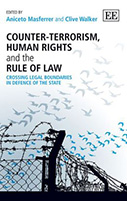Counter-Terrorism, Human Rights and the Rule of Law: Crossing Legal Boundaries in Defence of the State

Editors: Aniceto Masferrer and Clive Walker
Publisher: Cheltenham, UK; Northampton, MA: Edward Elgar, 2013. 360p.
Reviewer: Stéphane Lefebvre | July 2014
The authors in this edited collection analyze the legal responses of democratic states to terrorism, and the impact of these responses on human rights and the rule of law. They take a multidisciplinary approach, with an emphasis on comparative insights from Continental Europe. Their contributions are divided into 14 chapters grouped into four parts: (1) Crossing Legal Boundaries in Conceptual Categories; (2) Crossing Legal Boundaries from Liberty to Crime; (3) Crossing Legal Boundaries in Criminal Justice Systems; and (4) Crossing Legal Boundaries in Counter-Terrorism organizations. Chapters address issues that are specific to particular countries (e.g., safety interviews in the United Kingdom, the distinction between anti-terrorist and criminal justice measures in Ireland), narrow in scope (e.g., the right of access to a lawyer and military detentions) or broad (e.g., criminal law versus international criminal law).
The salient points from the various authors that, in my opinion, are of most general interest are the following:
- Terrorism remains an essentially contested concept in criminal law. It is variably associated with common crimes, state crimes, and armed resistance against oppression or foreign occupation. Mariona Llobet Anglí suggests that terrorism differs from other crimes. For instance, the harm terrorism causes reaches beyond the victims of an attack. It is a source of terror as well, the purpose of which is to coerce democratic governments to accept the demands of the terrorists. Its violence is indiscriminate and usually recursive, and endangers the life, freedom and well-being of individuals. Terrorism directed at a non-democratic state, on the other hand, can be legitimate as long as it does not instrumentalize or cause harm to the general population.
- The security versus human rights debate in the fight against terrorism is somewhat a false dichotomy. On the one hand, there is a lack of consensus on the nature and limits of a right to security. On the other, it is unclear how far the rights of individuals should limit the exercise of state power when the state is faced with a threat that is unpredictable and whose consequences are irreversible. Although “democracy alone cannot guarantee freedom” (p. 60), it does not mean that the exercise of state power should be unlimited. Aniceto Masferrer hence argues that to prevent the state from exercising unlimited power, human rights should be thought of as prior to the existence of the state instead of as a creation of the state. That way, there would not be a dichotomy: the state would not be able to claim the right to be able to dispose of human rights on the basis of an utilitarian argument.
- After 9/11, the debate about national security, human rights, and civil liberties was often simplistic, and marred by alarmist and a-historical assertions about the post-9/11 terrorist threat. As a result, counterterrorism policies may have been disproportionate, albeit symbolically aligned with the tenets of a risk society which considers the protection of the population as paramount. As Jon Moran notes, the situation in the United Kingdom between 2001 and 2007 was further characterized by a Labor government bent on pursuing a security agenda, even at the cost of undermining the judicial system (by criticizing judges for allegedly being soft in deciding cases). Democratic accountability was therefore negatively affected and damaging to civil liberty (which, in any event, had been overridden by human rights considerations).
- The introduction of glorification offences in criminal law exemplifies the ever-increasing criminalization of activities that are believed to be helpful in the preparation and commission of terrorist acts. As Francesca Galli observes, several of these new criminal offences have not added much capability to the fight against terrorism, and often have been overbroad or vague. Their use in criminal court has proved difficult too, as the mens rea is usually emphasized over the actus reus. Finally, the mere fact of their existence and focus on future harm suggests that preventive powers and police intervention are now as, if not more, important than catching terrorists after the fact. This continuous shift toward prevention gives greater weight to secret evidence and reduces judicial scrutiny.
- The use of counterterrorism measures is expensive and their effectiveness under-evaluated. Susan Donkin and Simon Bronitt thus regret a general lack of commitment on the part of lawmakers to embrace the empirical evaluation of counterterrorism measures. They suggest that a wide range of methodologies be used systematically to evaluate them but only after the desired outcomes have been determined.
- Internationally, police cooperation against the terrorist threat is largely done through informal structures and networks (e.g., Interpol). As a result, Saskia Hufnagel writes, the protection of human rights remains a serious concern. The more actors there are the less likely international cooperation mechanisms will be formalized. Even if some of these mechanisms are formalized, they are often supplemented with informal cooperation structures. As well, the “greater the diversity of human rights standards, the more informal cooperation must become” (p. 263). Whether the cooperation mechanisms are formal or informal, what are needed in both cases are high human rights standards.
Overall, this edited book contains very informative, well-researched and well-argued chapters. It brings to the fore legal and conceptual issues that have preoccupied lawyers, academics and government officials since 9/11. Particularly interesting and valuable is the chapter by Donkin and Bronitt on the evaluation of counterterrorism measures. To know what does and does not work on the basis of solid empirical evidence is challenging, but important given how much money and effort is spent on the terrorist threat by comparison to other law enforcement measures. Their advice should be heeded.
In general, a caveat with respect to the recommendations offered here is that Americans may not easily relate to the issues that are specific to Europe and European countries. That said, the lessons should not be dismissed out of hand. As the terrorist threat is a collective one after all, there is merit in allies comparing notes in devising solutions that would both counter the threat and protect human rights and civil liberty at the same time.
Stéphane Lefebvre is a PhD candidate at the Department of Law & Legal Studies of Carleton University in Ottawa, Canada. He has published over 20 book chapters and journal articles and over 75 book reviews.


